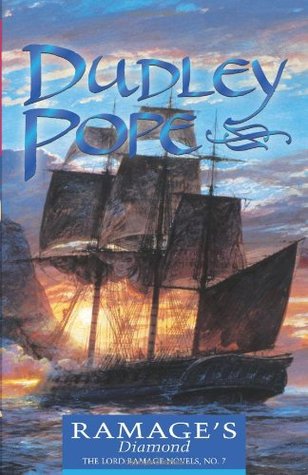[button color=”black” size=”big” link=”http://affiliates.abebooks.com/c/99844/77798/2029?u=http%3A%2F%2Fwww.abebooks.com%2Fservlet%2FSearchResults%3Fisbn%3D97803805782833″ target=”blank” ]Purchase here[/button]
In the seventh book of his naval adventures, Lord Nicholas Ramage attains to the rank of post-captain. This is to say, “Captain” is finally his official rank, and not just the courtesy title afforded to any Royal Navy Lieutenant who happens to command a ship. Now he can aspire to command any size of warship, up to the massive “ships of the line” that supply much of Britain’s firepower against the combined navies of Spain, the Netherlands, and Napoleonic France. Meanwhile, however, he has been given command of a 32-gun frigate, Juno by name, and dispatched to the West Indies with orders for Admiral Davis, orders direct from the First Lord of the Admiralty.
Ramage knows only that the Admiral’s orders have to do with some special, urgent mission. If he hopes that Davis will send him on that mission, his hopes are in vain. Instead, the Admiral sends one of his favorite frigate-captains on the mission, and puts Ramage on blockade duty along the coast of the French island of Martinique. Nevertheless, our young hero very quickly turns his tedious assignment to good account, first by capturing a couple of privateers that tried to capture Juno, then by accomplishing the almost unbelievable feat of setting up a battery on the 500-foot-high haunt of goats known as Diamond Rock. The only thing more unbelievable than this fictional achievement is the fact that it actually pales next to the historical fact it is based on!
Then it’s just a matter of waiting until the expected French convoy rounds the southern point of Martinique. But in spite of his late amazing run of luck, Ramage has good reason to worry. His expected reinforcements haven’t arrived, and time is running out. Under-gunned, under-manned, he may find himself facing suicidal odds and vastly superior forces, with nothing in his favor but the element of surprise.
The suspense is good, and it is also wonderful to see Ramage moving into the next phase of his career–building relationships with his own lieutenants, commanding larger forces, holding more responsibility, and running more complex tactics. The one weakness of this book, particularly alongside others in this series, is the almost anticlimactic ease with which Ramage’s great crisis resolves itself. Heck, strike the word “almost”–the lopsided battle against the much larger French forces tilts so dizzyingly in the other direction that it smacks of deus ex machina, only with a makeshift land-battery instead of deus and a freak collision instead of machina. One could reasonably regret not seeing Ramage claw victory out of the enemy’s grasp by sheer boldness and tactical brilliance… instead, he so seems to owe his victory to luck that even Ramage himself feels cheated, to say nothing of the reader.
On the other hand, I suppose such things happened in real life, and if they hadn’t there might not be an eighth Lord Ramage Novel to look forward to. And it does seem that his gamble on that land-battery idea of his paid off in a big way. But now that he has succeeded so successfully that Admiral Davis is willing to give him that special mission, Ramage must swallow the bitter pill of what that mission involves. I’m not telling, though. You’ll have to stand by for Book 8, Ramage’s Mutiny….
Recommended Age: 12+




